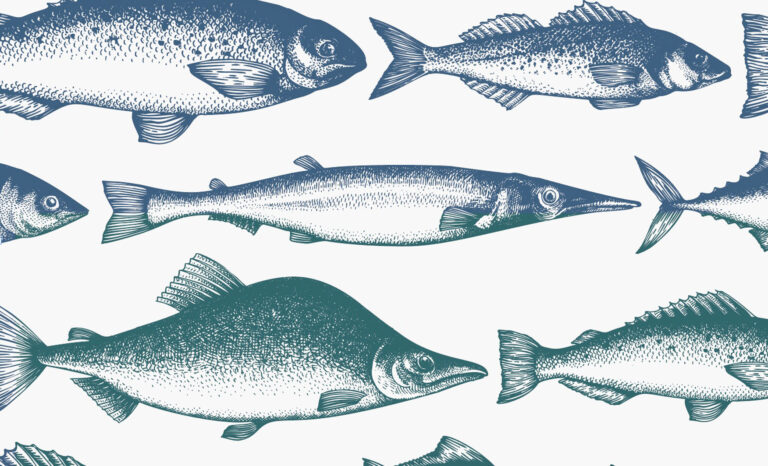
Vicki is a registered dietitian nutritionist, lifestyle nutrition expert, writer, culinary and media consultant and author of two books.
Seafood plays a key role in protecting brain health as people age — but how much do you need?
Fact checked by Jim Lacy
If you could make dietary choices knowing you were optimizing your brain health, would you? Researchers have spent decades trying to confirm a clear link.
Among their best answers so far: fish. This nutritious option has shown great promise for overall health, but especially for fending off inflammation, which protects cognitive health.
And as the global population ages, brain health takes center stage. An estimated 50 million people are living with dementia worldwide, and the prevalence of mild cognitive impairment — the intermediate stage between normal cognitive aging and dementia — is on the rise, appearing in 10% to 20% of adults aged 65 and older.
Fish is one of the main dietary components of the MIND diet — a well-researched dietary pattern that studies show can preserve cognitive function throughout aging.
Rich in omega-3 fatty acids, fish contains the nutrients docosahexaenoic acid (DHA), eicosapentaenoic acid (EPA), and choline, which are all essential for brain function. “Some types of fish, like sardines and salmon, also provide vitamin D, which has been linked to better cognitive function,” says Rachelle Mallik, a reproductive dietitian and owner of The Food Therapist in Chicago’s North Shore.
“Choosing a variety of low-mercury options — salmon, sardines, cod, and trout — helps maximize benefits while minimizing exposure to contaminants.”
Vitamin D deficiency is a risk factor for dementia, Alzheimer’s disease, and cognitive impairment. The amount of vitamin D in fish can vary depending on the species, how it was caught (wild or farmed), and the cooking method. Fatty fish such as salmon can contain well over 100% of your daily vitamin D needs in a 6-ounce serving.
“Fish delivers several important nutrients for your body and brain,” says Bethany Doerfler, senior clinical research dietitian at the Northwestern Medicine Digestive Health Institute. The essential fats DHA and EPA that fish provide “may be neuroprotective for their effects on vascular health, as well as helping to preserve brain structure and function,” Doerfler adds.
Science shows that these two fats are major protective factors in the human nervous system, with the brain as its command center.
How much fish supports healthy brain function?
The American Heart Association and the latest Dietary Guidelines for Americans recommend at least two servings (8–12 ounces) of fish or seafood per week.
“Choosing a variety of low-mercury options — salmon, sardines, cod, and trout — helps maximize benefits while minimizing exposure to contaminants,” Mallik says. If you avoid seafood, start slowly by incorporating tuna into a salad or smoked salmon on whole-grain toast. Increasing fish consumption over time will help make it a long-term lifestyle change.
People with dietary restrictions that prohibit fish or who simply don’t like it or have fertility and pregnancy-related concerns, often turn to omega-3 supplements. There are algae-based omega-3 options for those with seafood allergies.
New to cooking fish? Try wrapping it in parchment paper — also called en papillote — with a layer of thinly sliced zucchini, halved cherry tomatoes, baby spinach, a drizzle of extra virgin olive oil, and a sprinkle of seasonings. Then, pop it in the oven. “This method keeps odors contained and makes cleanup easy,” Mallik says.
She also suggests adding flaked fish to pasta dishes or tacos as an easy way to work it into meals you already enjoy.
And while you’re cooking, keep the big picture in perspective: Eating patterns help fend off age-related diseases, such as cognitive decline and dementia. “Eating fish is part of an overall anti-aging pattern that keeps us well in our later decades of life,” Doerfler says. “Fish, along with plant-based produce and fats, legumes, and whole grains, can [help] keep your body and brain well into older years.”
But if you are just not a fish fan, remember that science shows there’s no one ultimate brain food; eating a matrix of whole foods is vital in preserving brain function. Be aware, though, that large fish, such as king mackerel, marlin, orange roughy, shark, tilefish, and swordfish, are high in mercury. Therefore, healthy adults should limit their intake to 4 ounces per week, and pregnant or breastfeeding women, and children under age 11 should avoid them, according to Food and Drug Administration guidelines. If you have questions about the best fish choices, consult a registered dietitian nutritionist for a personalized plan.















